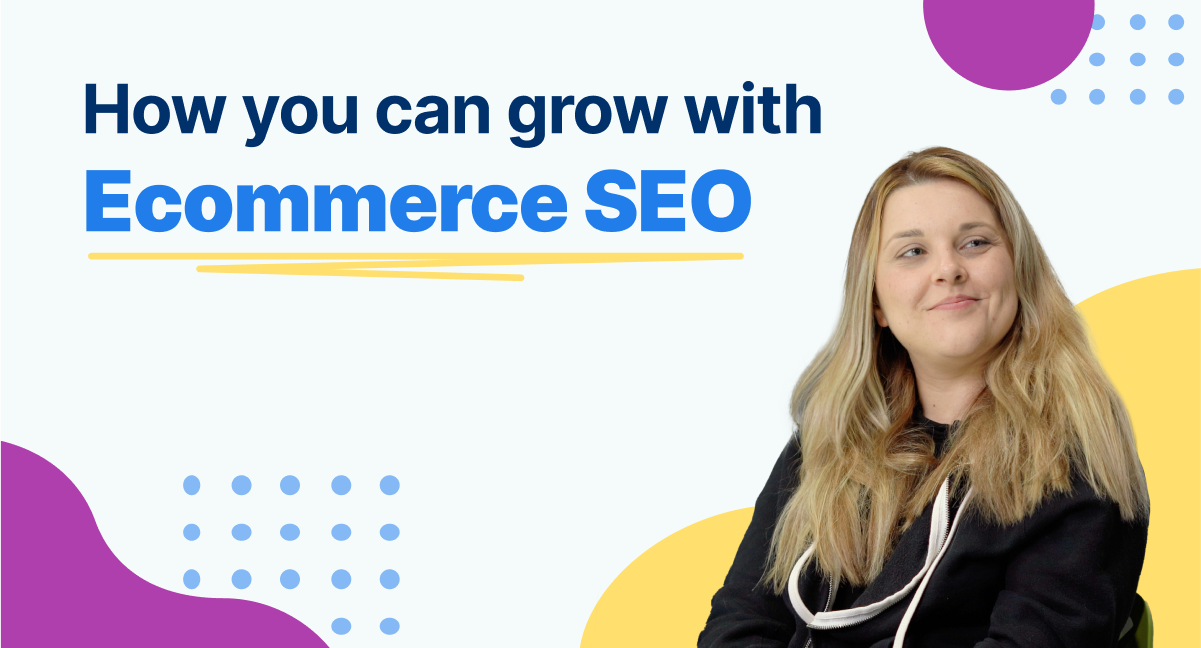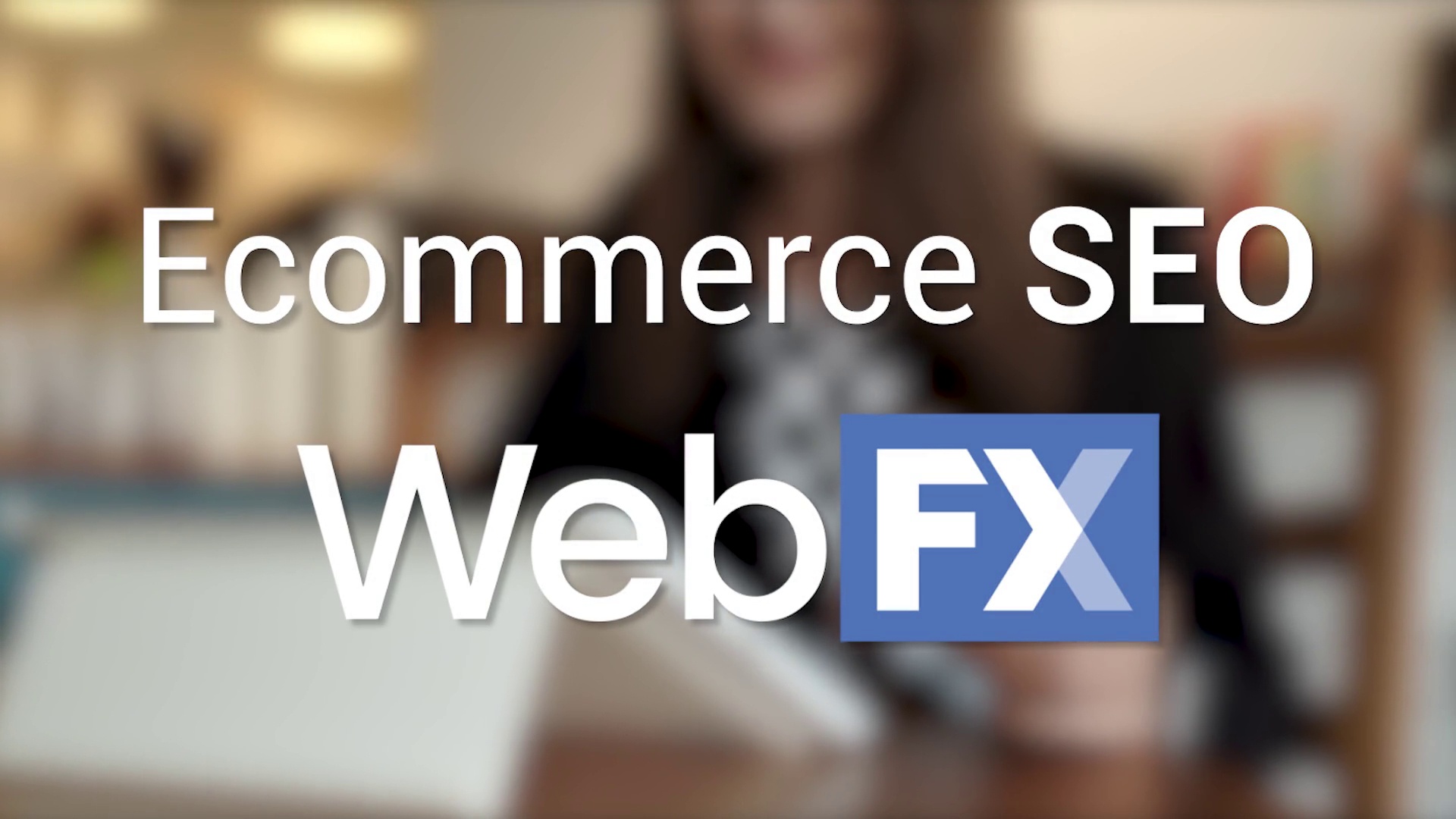Retention Rate
Industry average: 50%
WHY IS OUR RETENTION RATE SO HIGH?
Scalable solutions
Industry specialists
Proven results
CLIENT SATISFACTION SCORE
Industry average: 72%
WHY IS OUR SATISFACTION SCORE SO HIGH?
Project management
ROI tracking
Diverse skillsets
“I have 16 years of industry experience, and WebFX is the best agency I’ve ever worked with.”
 Flavia A, Review from Clutch.co
Flavia A, Review from Clutch.co
HIGHER NPS® SCORE THAN
Industry average: 16
WHY IS OUR NPS SO HIGH?
Turn-key solutions
Real business results
Consistent communication
Ecommerce SEO Services: Grow Your Online Sales
Capture more online sales with ecommerce SEO services from WebFX. Access the team and tech that have helped our clients earn $10 billion in revenue, and use them to accelerate your earnings from the web. Get your custom proposal now!
What do your ecommerce SEO services include?
Get everything needed to develop, implement, and manage a revenue-generating SEO plan with our ecommerce SEO services:
 Overview
Overview
Overview
Get a full-service solution that includes:
- Dedicated team
- Website audit
- Customized strategy
- On-page, off-page, and technical SEO
- SEO content, including for product pages
- Marketplace support
- Regular reporting, including for revenue and ROI

 Audit
Audit
Audit
Learn what’s working (and what’s not) with a comprehensive SEO audit. Your dedicated team of ecommerce SEO specialists will use this audit to compile:
- SEO issues
- Opportunities
- Competitor insights
- Recommended strategy
- And more

 Ongoing SEO
Ongoing SEO
Ongoing SEO
Get an ecommerce SEO strategy that moves vs. dawdles with a dedicated team for developing, implementing, and monitoring ongoing SEO optimizations for:
- On-page SEO
- Off-page SEO
- Technical SEO
- Ecommerce SEO
- SEO content

 Marketplace support
Marketplace support
Marketplace support
Sell on other marketplaces, like Amazon, Walmart, and Target? Get expert support from our award-winning team, and accelerate the returns from those channels. Learn how we can support below:

 Reporting
Reporting
Reporting
Measure the metrics that matter with an ecommerce SEO agency that focuses on the numbers that matter to you and your leadership team, including:
- Online sales and/or quote requests
- Phone calls
- Lead quality (if applicable)
- Average order value (AOV)
- Return on investment (ROI)

View plans and prices
for revenue-generating ecommerce SEO packages
CUSTOM ECOMMERCE SEO PLANS
Starting at
$2,500 / month
How we determine pricing
 Website Size
Website Size
The number of products and pages on your site will affect your monthly quote
 Asset Creation Needs
Asset Creation Needs
WebFX can support with content, link building, ecommerce testing (CRO), video or graphic creation, and more. The level of support needed here will affect your monthly fee.
 Partnership Needs
Partnership Needs
All clients get monthly performance reports and consultation discussions, but we’re happy to support those companies that need more detailed reports or weekly meetings.
INCLUDED IN ALL PLANS:
- Technical SEO audit and resolution to establish strong website foundation
- Advanced keyword research and mapping strategy for core products
- On-page optimization including titles, metas, sitemap creation, and more
- Quarterly asset creation – Content, Linkbuilding, Consulting, or CRO Assets
- Conversion tracking including transactions and phone calls
- Monthly keyword, traffic, and ROI performance reporting
- Quarterly competitor conquest reports
- Dedicated internet marketer backed by 500+ FXers to support
Your search for an ecommerce SEO company ends here
When your company partners with WebFX, you:
Pricing custom to you.
Starting at $3,000 per month.

Unlock a 20% increase in ROI with our award-winning ecommerce SEO agency
- Dedicated account manager with an in-house team to develop and implement assets
- All-in-one platform for optimizing, measuring, and reporting SEO’s ROI
- Built from your business objectives, market changes, and overall marketing efforts
- In-house project management software, 24/7 help desk, and direct client phone line
Typical SEO agency
- Dedicated account manager that’ll need your time to develop and implement assets
- Third-party toolkit for tracking SEO’s performance with subscription costs passed to you
- Copy-and-paste checklist for optimizing your site and (hopefully) delivering results
- Regular, but unreliable when site issues happen, and you need help now
In-house SEO
- One or more team members searching for the time to optimize 200+ ranking factors
- Free and paid tools for auditing, monitoring, and measuring rankings and traffic
- S.M.A.R.T. goals, but difficult to achieve with limited resources, time, and skillsets
- Varied with documentation gaps leading to project delays and wasted budget.
Get all the benefits of online shopping with ecommerce SEO experts
Why implement an ecommerce SEO strategy? Here are just some of the benefits you can enjoy when you (or your ecommerce SEO experts) implement an effective strategy!
- Connect you with high-value shoppers
- Optimize your entire product line
- Improve your online visibility
- Optimize marketing spend
- Generate long-term revenue
- Compete against competitors
Connect you with high-value shoppers
Connect you with high-value shoppers
Your potential customers are ready to hand over their hard-earned cash — but without SEO, they may never even know your store exists. Our ecommerce search engine optimization services make sure your store is visible so that you can maximize your profits.
Ecommerce SEO is the online equivalent of placing a huge sign in front of a brick-and-mortar storefront that says, “We carry dog toys!” or “We sell cat supplies!” Without optimizing your website for these key phrases, your chance at showing up in searches for keywords with high buying intent is slim to none.
Instead, it’s your competitors that do — and they’re happy to adopt your shoppers.
Optimize your entire product line
Optimize your entire product line
As an online store, you probably have an expansive product line — even if you offer shoppers a smaller, curated selection, it’s essential that your target audience can find your goods when searching online.
As your ecommerce SEO consultant, we optimize each of your products.
The result? Users that search for, “memory foam dog bed,” or, “orthopedic cat bed,” find your website and your products. Even better, they find what they’re looking for, which translates to another online order for your business.

In comparison, if your company relied on traditional marketing, you’d have to settle on marketing one or two of your products — unless you had a massive marketing budget. While you’d probably market your most popular products, you couldn’t guarantee you’d reach your target audience.
With WebFX, you can optimize your site to reach your most qualified customers.
Improve your online visibility
Improve your online visibility
Ecommerce SEO focuses on improving your online visibility to search engines. By increasing your visibility, ecommerce SEO makes it easier for consumers to find your website. So, instead of appearing on page two of search results, your website shows up on page one.
Ignore SEO, and your business becomes vulnerable to several risks, including:
- Lower search result rankings
- Fewer purchase orders
- Less revenue
These are all risks that impact your bottom line, as well as daily operations. If you’re not driving valuable traffic to your website, you’re not making sales, which leads to a downturn in your overall profits. That’s not sustainable.
With our competitive and innovative strategies, we maximize your visibility in search results. That’s why our team invests the time to learn your business, from your products to your shoppers, and builds a personalized strategy that drives results.
Due to our customized approach, we’ve generated more than $10 billion in revenue for our clients.
Optimize marketing spend
Optimize marketing spend
Compared to traditional marketing, ecommerce SEO is extremely cost-effective. By focusing on the keywords your target audience uses — and optimizing your website for those keywords — SEO drives the results you want to see.
It’s also the foundation of a powerful, performance-driven digital marketing strategy.
With the money your company saves with SEO, you can reinvest in your business’ success. For example, you’ll expand your ecommerce marketing strategy to include pay-per-click (PPC) advertising or email marketing — both of which offer a high return on investment (ROI).
By integrating email and PPC services into your marketing mix, you can effectively drive targeted traffic to your site, complementing your SEO efforts and maximizing your overall marketing impact.
Generate long-term revenue
Generate long-term revenue
With a close rate of almost 15% — meaning 15% of all leads will convert — SEO offers a reliable and long-term source of revenue for your company. That’s why SEO is a long-term and ongoing process — it doesn’t deliver results overnight, but it does deliver over time.
While 15% may seem less-than-stellar, it’s eight times more than traditional marketing’s close rate of 1.7%. That’s a terrible close rate, especially considering the investment your company’s making each year into traditional marketing.

It’s another reason why digital marketing is becoming the trusted choice of ecommerce stores.
With the continuous results of ecommerce SEO, your company can grow over time. That translates to achieving your company’s long-term goals, which may include expanding your product line, building your team members, or reaching your dream number of sales.
The best part is that you don’t pay for the results of ecommerce SEO, unlike PPC. While the two services work well together, you pay for every click that PPC earns your company. That cuts into your overall ROI and profits. Plus, it makes your business dependent on paid advertising to drive revenue.
Compete against competitors
Compete against competitors
Without an ecommerce SEO strategy and trusted ecommerce SEO company, expect your competitors to beat you out in search results.
Even if you create an amazing ecommerce website with a beautiful design that naturally attracts hundreds of links, a competitor with a solid ecommerce SEO agency will outrank you almost every time, in every search. It’s not enough to have part of the package.
With competition as high as it is online, you need the complete package — and with a personalized ecommerce SEO package from WebFX, that’s exactly what you get. As your partner, we’ll develop a customized and competitive strategy that places you at the forefront of your industry.
FAQs about ecommerce SEO services
What is ecommerce SEO?
Ecommerce SEO refers to SEO for ecommerce websites. Compared to traditional SEO, ecommerce SEO uses different strategies and techniques to improve your site’s ranking in search results, like on Google or Bing.
What are ecommerce SEO services?
Ecommerce SEO services provide your online business with professional, specialized SEO services for your ecommerce website. These services, compared to traditional SEO services, focus on ecommerce-specific tactics, like using product markup, to improve your website’s visibility in search results.
How much do ecommerce SEO services cost?
Prices for ecommerce SEO services vary and depend on the agency and their service plans. At WebFX, our SEO services for ecommerce websites cost $2500 to $7500 per month. We also offer custom pricing for larger online stores.
What do ecommerce SEO services include?
Ecommerce SEO services (like those from WebFX) include:
Keyword identification
Before making any changes to your website, we first do research to identify the words and phrases you need to include in your content. These are called keywords or key phrases.
By using keyword research tools, asking your customers how they describe your products or working with you to find the keywords you already know are successful, we’ll find out how you should describe your store or products to rank highly in searches.

Keywords most often pertain to your products or your store’s central theme. If you sell eco-friendly pet products, for instance, you may target keywords related to that theme or focus. A few examples include, “eco-friendly pet products,” “eco-friendly dog toys,” and “eco-friendly dog harness.”
Your company’s unique features can also enhance other aspects of your ecommerce SEO. If you’re investing in content marketing, for instance, you may create blog posts that discuss harmful products in dog food. For that type of post, you may target the keyword, “bad ingredients in dog food.”
Keyword identification is a critical part of our ecommerce search engine optimization services because it establishes an effective strategy for your business.
Keyword implementation
The next step in our process is to implement these high-value, relevant keywords onto your website.
Our ecommerce SEO experts use these keywords in several places, including:
- Homepage
- Page titles
- Meta descriptions
- Product descriptions
- Image alt text
- And more
This step is essential to an ecommerce SEO strategy. Without optimizing your website for these relevant keywords, it’s difficult for search engines — and even users — to see that your website is relevant to a search query.
While you can do your own copywriting to implement these recommended keywords, an advantage of partnering with a full-service digital marketing agency, like WebFX, is that we offer SEO copywriting services — note that some copywriting comes with our ecommerce SEO packages.
If you decide to invest in our copywriting services for ecommerce SEO, we feature a talented team of copywriters that specialize in several areas, from manufacturing to retail to automotive. With their expertise, we produce content that’s not only well-written, but also on-par with your brand.
Product page optimization
Every page on your website needs optimization for search engines.
When it comes to ecommerce stores, it’s hard to find anything more important to optimize than product pages. Product pages are extremely significant because they are most likely to rank for very specific search phrases, also known as “long-tail keywords.”
If you sell rubber dog bones in green, you’re probably not going to have the long-tail keyword, “green rubber dog bone,” on your homepage. Instead, your ecommerce SEO strategy would focus on optimizing product pages for these appropriate long-tail keywords.
To ensure that your product pages earn a high ranking in search results, we’ll make sure that each page has a title, as well as a paragraph or two of keyword-rich copy that describes the item. It’s also a good idea to include the model number (if there is one) so you show up in searches for that, too.
Your product pages should also include images of the items you are selling.

Images offer value to users and search engines. For users, your images provide perspective on your product, from its size to its color to its uses. For search engines, your images offer insight into the context of your product page.
It’s important to note, however, that it’s critical to optimize images for search engines. Google, as well as Bing, Yahoo, and other search engines, cannot “read” images. They rely on the image filename, image alt text, and nearby content to understand images.
That’s why our dedicated team optimizes your images for SEO.
Plus, we review each page of your website in-depth to ensure that you’re targeting long-tail keywords and that you’re not missing crucial SEO elements like title tags. The result is a product page that’s ready to convert consumers.
Navigation optimization
SEO for ecommerce sites also includes making your site user-friendly. You need an easy-to-navigate website, even if you carry a wide variety of products. We’ll make sure that everything has appropriate sections or categories, and that there is a link to each top-level page from somewhere in your menu.
It’s also essential that your navigation is easy to use and understand.
If not, you may find that users get confused and leave your site almost as soon as they arrive. Why stay if they can’t find what they want? This quick departure — also called a “bounce” — can lead to a higher bounce rate.
High bounce rates tell search engines that your website isn’t as relevant for the search terms it’s ranking for — which is why a high bounce rate can lead to a drop in your rankings. That’s why web design, as well as the design of your landing pages, is an imperative feature of ecommerce SEO.
One of the best ways we’ve found to improve SEO for ecommerce is to use breadcrumb navigation.
Breadcrumbs are small links that appear at the top of a menu, category, or product page. Like the story of Hansel and Gretel, a trail of breadcrumbs on a website leads you back to where you were previously.
Our award-winning web designers will use this method to add links and keywords to your pages and maximize the usability of your websites for users. For maximum results in your website’s usability, we offer user experience testing services.
Content creation
Since it’s difficult to compete online, one of the best ways you can both add SEO value and draw in shoppers is to create original content for your ecommerce store. Content can come in the form of a blog, articles, press releases, and even ebooks.
A content marketing strategy serves two purposes: one, to give search engines even more content to crawl for keywords and phrases, and two, to tell your potential customers that you are knowledgeable and trustworthy.
The best part is content marketing can double your website’s conversion rates. Why? With unique and informational content, you’re offering value to users, whether by answering their questions or offering them guidance.
More than 60% of users prefer companies that create custom content, which can set your ecommerce store apart from others in your industry. That’s why companies that use content marketing more than quadruple their conversions compared to businesses that don’t.
For content marketing, most ecommerce websites choose to set up a blog. Blogs come in many shapes and sizes and can have one post a month or multiple posts a day. For your online store, you may find it easiest to focus on one or two posts a week.
You can write about anything your customers might find relevant, like trends in your industry or new products. If you sell pet supplies, you could even run a contest to find the cutest pet among your shoppers.

Additional content may include:
- Videos for how-tos on product maintenance or uses
- Infographics on topics related to your products or industry
- Articles about industry topics you are knowledgeable about
- Long-form content like ebooks or white papers
With a talented team of writers, as well as a creative team of Internet marketers, WebFX builds innovative content marketing strategies as a part of our ecommerce SEO packages.
What form this content takes is up to you, and we’ll work together to decide what kind of content is best for your website, then create it for you and implement it on your site. SEO for ecommerce sites includes all these factors and more to make your website rank as highly as possible.
How long does ecommerce SEO take?
Ecommerce SEO, like traditional SEO, can take several months to show results. In most cases, you can expect to see results, like increased rankings, after three to six months. This three- to six-month wait is why most SEO services for ecommerce websites require a commitment of a few months.
What kinds of online stores can use ecommerce SEO services?
Any online store can use ecommerce SEO services.
At WebFX, our experience with providing SEO services to ecommerce websites encompasses more than 29 years. We’ve also partnered with clients that use a range of ecommerce platforms, from Shopify to WooCommerce.
View ecommerce SEO service plans
Learn more about what our ecommerce SEO services include by exploring our four ecommerce SEO packages, which we can customize to your business. All our ecommerce SEO experts are familiar with using and optimizing platforms like Shopify, WordPress, BigCommerce, and more for ecommerce SEO.
| Features | Silver | Gold | Platinum | Diamond | Enterprise |
|---|---|---|---|---|---|
| Number of keyphrases optimized (Keyphrases with less than 1M results) | Up to 150 | Up to 200 | Up to 250 | Up to 300 | Custom |
| Pages Optimized | Up to 30 | Up to 40 | Up to 50 | Up to 60 | Custom |
| Technical Website Analysis & Opportunity Report | Custom | ||||
| Keyword research & selection | Custom | ||||
| Keyword mapping to target pages | Custom | ||||
| Title Tags & Meta descriptions | Custom | ||||
| Robots.txt optimization | Custom | ||||
| XML sitemap creation & submission | Custom | ||||
| Quarterly Earned Media Content Assets – Content, Linkbuilding, Consulting, or CRO Assets | 6 Content, Outreach, UX, or CRO Assets | 12 Content, Outreach, UX, or CRO Assets | 15 Content, Outreach, UX, or CRO Assets | 24 Content, Outreach, UX, or CRO Assets | Custom |
| Google Business Profile optimization (if needed) | Custom | ||||
| Information architecture audit | Custom | ||||
| Canonicalization analysis | Custom | ||||
| Initial external link analysis and disavow | Custom | ||||
| Link redirect audit | Custom | ||||
| Internal linking restructuring & optimization | Custom | ||||
| Duplicate content analysis | Custom | ||||
| Header Tags Optimized (Ex. H1s) | Custom | ||||
| Setup of website sitemap | Custom | ||||
| Image optimization | Custom | ||||
| Custom 404 error page setup and optimization | Custom | ||||
| Schema Implementation (JSON-LD) | Custom | ||||
| Google Analytics setup w/ conversion tracking | Custom | ||||
| Google Analytics traffic analysis | Custom | ||||
| Google Data Studio Reporting Dashboard Setup | 8 dashboards | 8 dashboards | 10 dashboards | 10 dashboards | Custom |
| Initial visitor profile report | Custom | ||||
| Ongoing quarterly keyword ranking reporting | Custom | ||||
| Ongoing monthly traffic, goal & CPL reporting | Custom | ||||
| Ongoing user experience reporting (bounce rate, device category, etc.) | Custom | ||||
| Ongoing quarterly competitor conquest reports | Custom | ||||
| Keyword rank checker access with weekly updates (if requested) | Custom | ||||
| Ability to check location data accuracy across 40+ local directories | Custom | ||||
| A/B Testing of SERP title & description to improve clickthrough | Custom | ||||
| Notification of new reviews (major review platforms) | Custom | ||||
| CalltrackerFX access Learn more | Leverages | Leverages | Leverages | Leverages | Custom |
| Analyze your leads to project the # of leads competitors receive on a monthly basis | Custom | ||||
| Predict your and your competitors’ market share on a monthly basis | Custom | ||||
| Competitor intelligence login to view competitor data | Custom | ||||
| LeadManagerFX access Learn more | Leverages | Leverages | Leverages | Leverages | Custom |
| CompanyTrackerFX access Learn more | Leverages | Leverages | Leverages | Leverages | Custom |
| ContentAnalyticsFX access Learn more | Leverages | Leverages | Leverages | Leverages | Custom |
| Dedicated Internet Marketer | Custom | ||||
| Online Project Management Platform | Custom | ||||
| 450+ SMEs behind campaign driving results | Custom | ||||
| Website conversion analysis implementation | Custom | Custom | Custom | Custom | Custom |
| Initial campaign investment:(Two month duration) | $8,600 | $14,500 | $17,800 | $21,400 | Get Quote |
| Progressive monthly optimization:(6 month commitment – Subsequent 4 months) | $2,800 | $5,750 | $7,400 | $9,200 | Get Quote |
Need more information? Call Us: 888-601-5359 | GET STARTED | GET STARTED | GET STARTED | GET STARTED | GET STARTED |

























